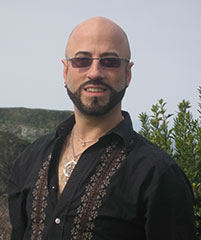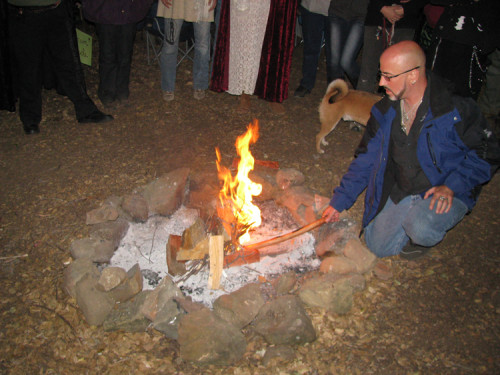SANTA CRUZ, Calif. — Orion Foxwood is a role model for many in the Pagan and related communities who wish to make their living serving their gods. A prodigious writer and familiar face at Pagan conventions and festivals, Foxwood criss-crosses the country lecturing on southern conjure practices and teaching the principles of Faery Seership. In recent years, attendees at Foxwood’s classes may have been surprised to see that he has been having difficulty walking even with a cane, the result of two chronic health conditions colliding. However, his students may have been reassured by his perennial good mood that the condition wasn’t as bad as it looked.
Now Foxwood is opening up about his condition and willing to admit that his constant pain is requiring him to cut back on his extensive travel schedule. He spoke with The Wild Hunt about his struggles, and how he views them through the lens of his Pagan practices.

Orion Foxwood
“When I started showing up with a cane, it shocked people,” he said. “I’m the energizer bunny.” However, people in the conjure and Voudoun communities had a different reaction, comparing him to loa Papa Legba, who stands at the crossroads and usually appears with a crutch or cane. In those traditions, a sacred wound “gives great medicine, but the cost is great.”
That cost has been quite high for Foxwood. His problems are twofold, he explained: rheumatoid arthritis and avascular necrosis. “Rheumatoid arthritis runs rampant through my family,” he said, and he’s seen several relatives nearly crippled by that condition alone. It can hit early, and hit hard. On top of that, he has avascular necrosis in his hip, meaning that the blood supply has been interrupted and the bone is dying. “If I were to continue like this, I’d be the hip necromancer,” he joked. Compensating for the disabled hip has led to problems with his knee, and combination has left him with pain that’s “mind-altering” in its intensity.
An orthopedist approached me and told me that I’m lying about my pain. It’s not 5-7 [on the ten-point pain scale], it’s 8-10. It’s like he gave me permission to open up like a clam shell, and I started crying.
Foxwood believes that it is not the job of an elder or teacher to be perfect, but to “demonstrate the restorative power of their practice.” For him, that began when “several powerful women” that he’s taught confronted him about his health. “They wanted to keep me alive as long as they could so they could keep learning from me,” he said, and to that end they wanted him to reevaluate his life on the Pagan lecture circuit. While he’s presently the sole breadwinner in his family, the traveling kept him from restorative rest, as well as much-needed physical therapy appointments.
“They asked if they could launch a fundraiser,” he recalled, “and if I’d be willing to talk about what my challenges are. They wanted to know if I would let myself fall back into their arms.” Accepting that offer was no easy task for a man who describes himself as a “hard-headed Appalachian boy with a Protestant work ethic.”
The result so far, Foxwood says, “has been incredible. From around every corner have come acts of compassion. People have provided information and insight.” He’s been offered healing from many sources, and has tapped into a “massive brain trust” of metaphysical and scientific knowledge.
As of this writing, the original crowdfunding campaign has reached 97.7% of its $5,000 goal in just twelve days. It was set up to help with some specific costs, such as copays and some naturopathic treatments, but given the outpouring of financial support, Foxwood said that the organizers are planning on revising it. “They want me not to have to work as hard while I’m healing,” he said.

Orion Foxwood 2013 [Photo Credit: Tony Mierzwicki]
I’m a traditionalist. I teach mouth to ear, in the kitchen and in the garden. I’ve been hesitant, but the first online class was incredible. I was able to sit in my living room in peace, and there was no energetic integrity lost at all.
More exciting than the revelation about online teaching, he said, has been watching students of many years step up and into their own power. Many who never would see themselves as healers have been providing him with the emotional and spiritual support that he needs to mend his body, and it’s delighted him to watch them reach that potential. And even as his students show their strength, he has been recognizing the lesson for himself in this struggle.
Your vulnerability is your strength. You invite people into holiness, to rise up and show their power and strength; it can be an affirmation for others. I keep telling leaders, don’t deify your hurt and sing your song of sorrow like a national anthem, but be genuine and committed to healing, and know the restorative power of your practice.
He went on to say: “Strong people are telling me I don’t have to think about this, they’re just going to run the wording by me. Sometimes we want and need to be strong, but sometimes we need to be able to collapse and fall back in the arms of loving people. It’s a pretty extraordinary community. When you give people on a sacred path of some sort a chance to demonstrate holiness, they will. It may be during your own wounded times, or when you’re falling apart.”
By reducing his travel to focus on his own healing, Foxwood said that new possibilities are simultaneously opening up for him. Remaining in one place will allow him to write more, and he’s seriously considering a longtime dream of moving from North Carolina to Santa Cruz. It is probably a solid bet that there might be a book on sacred wounds in the offing.
The Wild Hunt is not responsible for links to external content.
To join a conversation on this post:
Visit our The Wild Hunt subreddit! Point your favorite browser to https://www.reddit.com/r/The_Wild_Hunt_News/, then click “JOIN”. Make sure to click the bell, too, to be notified of new articles posted to our subreddit.

Much love and healing to you <3
I have avascular necrosis in my femurs and ankylosing spondylitis, a cousin to rheumatoid arthritis. I’ve been living with these conditions for well over a decade now. The most common statement I hear from new doctors is “How do you even *walk*?” The pain is intense, although if you’re stubborn enough you can learn to live with it. My best wishes to you in keeping your conditions manageable and your pain light.
Orion, remember my interview with you for ACTION. I am sorry to hear about the level of pain, because pain can be exhausting. Yet you must take care of yourself first, this is the first duty not only to yourself, but to those who benefit from your work. Best of luck and taking care of this and always do what is best for the situation.
Blessings of healing to Orion. Thank you for sharing.
Blessings to you, my friend. May healing flow fully and easily, and every sweet drop be taken in, with ease and comfort.
If people would like to be a part of this campaign–even just keeping up with what is happening–there is a Facebook page you can join Healing and Upholding Orion, https://www.facebook.com/groups/222804088063508/